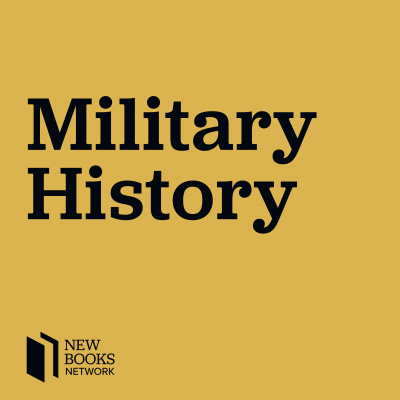Sinopsis
Interviews with Scholars of Military History about their New Books
Episodios
-
Juergen Matthaus et al., “War, Pacification and Mass Murder, 1939: The Einsatzgruppen in Poland” (Rowman and Littlefield, 2014)
18/05/2015 Duración: 52minHistorians have spent the last two decades detailing and explaining the actions of the Einsatzgruppen in the Soviet Union. We now know much more than we used to about the escalation of violence in 1941 and the so-called “Holocaust by Bullets.” The actions of the Einsatzgruppen in Poland, in contrast, are less well known.But they are crucial to understanding the evolution of violence against Jews and others.JuergenMatthaus, Jochen Boehler, and Klaus-Michael Mallmann set out to fill this gap.Their work War, Pacification and Mass Murder, 1939:The Einsatzgruppen in Poland (Rowman and Littlefield, 2014)–part of theUnited StatesHolocaust Memorial Museum’s excellent Documenting Life and Destruction series–sets carefully chosen documents into a richly described military and institutional context. By doing so, they illustratenot just what the Einsatzgruppen did, but how theiractions evolved over time, how they interacted withWehrmacht and political leaders and how this violence impacted
-
Michael Leggiere, “Blucher: Scourge of Napoleon” (U Oklahoma Press, 2014)
01/05/2015 Duración: 57minI have really enjoyed Michael Leggiere‘s earlier work, including the excellent Napoleon and Berlin : The Franco-Prussian War in North Germany, 1813 (2002), like this work, part of the Campaigns and Commanders series at the University of Oklahoma Press. In Blucher: Scourge of Napoleon (University of Oklahoma Press, 2014), Leggiere rescues Gebhard Leberecht von Blucher from the shadow cast by Wellington (and Wellington’s many and prolific admirers). It was Blucher, argues Leggiere, who continually bedeviled Napoleon after 1812 and who created the conditions for the Emperor’s few but decisive defeats, including Leipzig (1813) and Waterloo (1815) – hence the subtitle. Partly because of the focus on Wellington, partly because of myth-making on the part of German nationalists and military leaders, Blucher is too often presented as a strategic imbecile, a mere hard-charging hussar, deserving of the label applied by his troops: “Marshal Forward.” But Leggiere highlights BlucherR
-
Benjamin Armstrong, “Twenty-First-Century Mahan” and “Twenty-First-Century Sims” (Naval Institute, 2013-2015)
25/04/2015 Duración: 01h15minAlfred Thayer Mahan and William Sims – two of the most important figures in American Naval History – are the subject of our discussion with Lieutenant Commander Benjamin (“BJ”) Armstrong. A doctoral candidate in the Department of War Studies at Kings College London, Armstrong is the author of two books collecting and analyzing critical essays by both men: Twenty-First-Century Mahan: Sound Military Conclusions for the Modern Era (Naval Institute Press, 2013) and Twenty-First-Century Sims: Innovation, Education, and Leadership in the Modern Era (Naval Institute Press, 2015). We’re covering both books together in this interview, as they are so closely tied to each other conceptually and thematically, as well as being so recently published and available to the general public. Through the collected essays and his commentary, Armstrong makes a strong case for both the continued relevance and timelessness of the two men and their lesser known or understood works, not only as related to
-
Colonel Ty Seidule, “West Point History of the Civil War” (Simon and Schuster, 2014)
13/03/2015 Duración: 41minWe’re very fortunate to be joined by the editor of The West Point History of the Civil War (Simon and Schuster, 2014), the Head of the History Department at the United States Military Academy, Colonel Ty Seidule. Unlike most surveys, the new West Point History of the Civil War draws upon some of the best talent in the field of Civil War history, all called together to craft a synthetic text that not only forms the basis of the Military Academy’s course on the subject, but also provides a very informative overview for the general public. Lavishly illustrated and featuring well-conceived maps and graphs, The West Point History of the Civil War is served by a fully digitized version, optimized for use on tablet platforms. Our interview with Colonel Seidule focuses on the special challenges he and his team confronted in crafting this text, and the place of the Civil War in the American experience.Learn more about your ad choices. Visit megaphone.fm/adchoices
-
Don H. Doyle, “The Cause of All Nations: An International History of the American Civil War” (Basic Books, 2015)
16/02/2015 Duración: 01h07minMany Americans know about the military side of the Civil War, and the private, official diplomacy of the Civil War is also well documented. The Cause of All Nations: An International History of the American Civil War (Basic Books, 2015), though, focuses on public diplomacy — on the battle for public opinion in Europe (primarily) waged by Union and Confederate officials, private citizens, and their European supporters. White northerners were slower to realize what American blacks and European republicans recognized instinctively — that what was at stake in the American Civil War was not the political and territorial integrity of the United States, but the causes of progress and self-government. In The Cause of All Nations, Don H. Doyle has done the impossible — found a hitherto unappreciated feature of the American Civil War that forces us to reevaluate how we understand it.Learn more about your ad choices. Visit megaphone.fm/adchoices
-
Kenneth M. Swope, “The Military Collapse of China’s Ming Dynasty, 1618-44” (Routledge, 2014)
11/02/2015 Duración: 01h02minOur interview with Kenneth M. Swope about his book, The Military Collapse of China’s Ming Dynasty, 1618-44 (Routledge, 2014), published through Routledge, is an effort to address an oversight in how New Books in Military History has generally overlooked both early modern history and works that have an exclusively non-Eurocentric focus. Swope’s book presents a very detailed assessment of the many challenges that underlie the collapse of the Ming Dynasty in China in the seventeenth century. More importantly, though, he challenges many previously held suppositions about Chinese military capabilities, culture, and society — restoring the Ming to their appropriate place as one of the most well-organized and equipped armies of the early modern era (at least in theory, that is . . . .) Steeped in rare Chinese sources and rich in analysis, this book is an important contribution by one of the field’s most important experts.Learn more about your ad choices. Visit megaphone.fm/adchoices
-
Jan Lemnitzer, “Power, Law and the End of Privateering” (Palgrave, 2014)
22/01/2015 Duración: 39minJan Lemnitzer‘s new book Power, Law and the End of Privateering (Palgrave, 2014) offers an exciting new take on the relationship between law and power, exposing the delicate balance between great powers and small states that is necessary to create and enforce norms across the globe. The 1856 Declaration of Paris marks the precise moment when international law became universal, and is the template for creating new norms until today. Moreover, the treaty was an aggressive and successful British move to end privateering forever – then the United States’ main weapon in case of war with Britain. Based on previously untapped archival sources, Jan Lemnitzer shows why Britain granted generous neutral rights in the Crimean War, how the Europeans forced the United States to respect international law during the American Civil War, and why Bismarck threatened violent redemption during the Franco-German War of 1870/71. The powerful conclusion exposes the 19th century roots of our present international sy
-
Elizabeth Schmidt, “Foreign Intervention in Africa: From the Cold War to the War on Terror” (Cambridge UP, 2013)
21/01/2015 Duración: 43minElizabeth Schmidt‘sForeign Intervention in Africa: From the Cold War to the War on Terror (Cambridge University Press, 2013)depicts the foreign political and military interventions in Africa during the periods of decolonization (1956-75) and the Cold War (1945-91), as well as the periods of state collapse (1991-2001) and the “global war on terror” (2001-10). In the first two periods, the most significant intervention was intercontinental. The United States, the Soviet Union, China, Cuba and the former colonial powers entangled themselves in numerous African conflicts. During the period of state collapse, the most consequential interventions were intracontinental. African governments, sometimes assisted by powers outside the continent, supported warlords, dictators, and dissident movements in neighboring countries and fought for control of their neighbors’ resources. The global war on terror, like the Cold War, increased the foreign military presence on the African continent and generat
-
Glen Jeansonne and David Luhrssen, “War on the Silver Screen” (Potomac Books, 2014)
05/01/2015 Duración: 01h09sWar has been a constant topic for feature films since the invention of the motion picture camera. These events made for interesting stories and dynamic visual representations. In their book, War on the Silver Screen: Shaping America’s Perception of History (Potomac Books, 2014), Glen Jeansonne and David Luhrssen discussed a number of films that dealt with conflicts over the last 100 years. Beginning with World War I through the present War on Terror, the authors reviewed how selected films dealt with the issues of the particular war, the people who fought the war, and the society affected by the war. In this conversation with co-author David Luhrssen, he discusses how the book was conceived, how specific films were chosen, and the specific ways that the films represented the individual conflict.Learn more about your ad choices. Visit megaphone.fm/adchoices
-
Charles F. Walker, “The Tupac Amaru Rebellion” (Harvard UP, 2014)
23/12/2014 Duración: 39minCharles F. Walker‘s book The Tupac Amaru Rebellion (Harvard University Press, 2014) charts the rise, fall, and legacy of a massive uprising in colonial Peru. Indigenous societies in the Andes labored under heavy taxes, tributes, and discrimination imposed by the Spanish imperial state. Walker’s monograph follows the rebellion of a multiethnic group of indigenous, mestizo, and creole subjects, led by José Gabriel Tupac Amaru in 1780. Along with his wife Micaela Bastidas, Amaru’s leadership posed a serious challenge to Viceroyalty of Peru. Although ultimately unsuccessful, Amaru’s rebellion inspired and gave strength to other uprisings in the Andes. With an engaging narrative of the rebellion’s progress, Walker provides a vivid explanation of one of the largest and most important colonial rebellions in the eighteenth-century Americas.Learn more about your ad choices. Visit megaphone.fm/adchoices
-
Mark R. Anderson, “The Battle for the Fourteenth Colony” (UP of New England, 2014)
15/12/2014 Duración: 01h02minMy most current guest is Mark R. Anderson, author of The Battle for the Fourteenth Colony: America’s War of Liberation in Canada, 1774-1776 (University Press of New England, 2014). Anderson’s award-winning book presents the most detailed and nuanced study of the entire Quebec campaign in print today.Long an under-represented campaign in the general historiography of the American Revolution, the 1775 Canada expedition is brought to life in Anderson’s treatment, as he presents the story from multiple perspectives, including the American expeditionary force, the British Loyalists, and the Canadien inhabitants of the Quebec parishes.Anderson’s book addresses a major oversight in the historiography of the Revolution, and in the process, is a highly detailed political and military narrative that is destined to be the standard work in the field for years to come.Learn more about your ad choices. Visit megaphone.fm/adchoices
-
Boyd Cothran, “Remembering the Modoc War: Redemptive Violence and the Making of American Innocence” (UNC Press, 2014)
09/12/2014 Duración: 01h05minIf George Armstrong Custer had kept off of Greasy Grass that June day in 1875, Vine Deloria, Jr.’s manifesto might well have been called “Canby Died For Your Sins.” The highest ranking U.S. military official to be killed in the so-called “Indian Wars,” General Edward Canby’s death at the hands of Modoc fighters in 1873 unleashed a campaign of ethnic cleansing and guerrilla resistance later colloquialized as the Modoc War. An international sensation at the time and iconic in the decades following, the Klamath Basin struggle has been largely overshadowed in contemporary historical memory. In his razor-sharp account Remembering the Modoc War: Redemptive Violence and the Making of American Innocence (University of North Carolina Press, 2014), historian Boyd Cothran not only reconstructs this dramatic story but traces how various actors–pushed and pulled by the demands of an acquisitive capitalist market–transformed the memory of the war into a redemptive tale of Ame
-
Michelle Moyd, “Violent Intermediaries: African Soldiers, Conquest, and Everyday Colonialism in German East Africa” (Ohio UP, 2014)
04/12/2014 Duración: 01h06minIn her imaginative and scrupulous book, Violent Intermediaries: African Soldiers, Conquest, and Everyday Colonialism in German East Africa (Ohio University Press, 2014), historian Michelle Moyd writes about theaskari, Africans soldiers recruited in the ranks of the German East African colonial army. Praised by Germans for their loyalty and courage, the askari were reviled by Tanzanians for the violence and disruptions the askari caused in their service to the colonial state. Moyd questions the starkness of these characterizations. By linking askari micro-histories with wider nineteenth-century African historical processes, she shows how the askari, as soldiers and colonial intermediaries, not only helped to build the colonial state but also sought to carve out paths to respectability and influence within their own local African contexts. Moyd offers a truly fresh perspective on African colonial troops as state-making agents and critiques the mythologies surrounding the askari by focusing on the nature and con
-
John Morrow and Jeffrey Sammons, “Harlem’s Rattlers and the Great War” (University Press of Kansas, 2014)
04/11/2014 Duración: 01h18minJohn Morrow and Jeffrey Sammons share their insights on the story of the fabled 369th Infantry Regiment in their book, Harlem’s Rattlers and the Great War: The Undaunted 369th Regiment and the African American Quest for Equality (University Press of Kansas, 2014). Our guests reveal a great deal about the...Learn more about your ad choices. Visit megaphone.fm/adchoices
-
Carlotta Gall, “The Wrong Enemy: America in Afghanistan, 2001-2014” (Houghton Mifflin Harcourt, 2014)
23/10/2014 Duración: 01h21minPulitzer-prize winning New York Times reporter Carlotta Gall reported from Afghanistan and Pakistan for almost the entire duration of the American invasion and occupation, beginning shortly after 9/11. In her new book The Wrong Enemy: America in Afghanistan, 2001-2014 (Houghton Mifflin Harcourt, 2014), Gall combines searing personal accounts of battles and betrayals with moving portraits of the ordinary Afghans who endured a terrible war of more than a decade. Her firsthand accounts of Taliban warlords, members of the Pakistani intelligence community, American generals, Afghan politicians, and the many innocents who were caught up in this long war are riveting. Her evidence that Pakistan protected and fueled the Taliban and protected Osama bin Laden is convincing.Learn more about your ad choices. Visit megaphone.fm/adchoices
-
Beth Linker, “War’s Waste: Rehabilitation in World War I America” (University of Chicago Press, 2014)
23/09/2014 Duración: 01h04minBeth Linker is the author of War’s Waste: Rehabilitation in World War I America (University of Chicago Press, 2011). As she reveals, the story of individual rehabilitation from war-related injury was intertwined with other political concerns at multiple levels. These century-old accounts matter greatly, as the First World War was that point where modern rehabilitative medicine and social policy was born, with many of the attitudes and aspects of this early response lingering to the present day. Beth’s book is an insightful consideration of the conflicted responses Americans presented to the unanticipated challenges of post-war reconstruction and rehabilitation for the nation’s thousands of veterans, standing in no small way as a cautionary tale as America winds down from its latest conflicts.Learn more about your ad choices. Visit megaphone.fm/adchoices
-
Guy Chet, “The Ocean is a Wilderness: Atlantic Piracy and the Limits of State Authority, 1688-1856” (U of Massachusetts Press, 2014)
22/09/2014 Duración: 54minGuy Chet, Associate Professor of early American and military history at the University of North Texas, in his book The Ocean is a Wilderness: Atlantic Piracy and the Limits of State Authority, 1688-1856 (University of Massachusetts Press, 2014) makes a well-crafted argument for the persistence of Atlantic piracy in the eighteenth and nineteenth centuries, after the age of Blackbeard and Captain Kid. He asserts that piracy was not abruptly stamped out by the royal navy but remained normal rather than exceptional for a long time past the 1730s. The end of piracy is described in the traditional historical narrative as a speedy decline due to the central state’s extension of its authority into the Atlantic frontier and its monopolization of violence. Chet, following methodology established by legal and borderland historians, critiques this assessment pointing out that frontier conditions are sustainable for long periods of time. He fleshes out through each section of his work why the monopoly on violence p
-
Willard Sunderland, “The Baron’s Cloak: A History of the Russian Empire in War and Revolution” (Cornell UP, 2014)
04/09/2014 Duración: 01h07minThe Russian Empire once extended from the Baltic Sea to the Sea of Japan and contained a myriad of different ethnicities and nationalities. Dr. Willard Sunderland‘s The Baron’s Cloak: A History of the Russian Empire in War and Revolution (Cornell University Press, 2014) is an engaging new take on the empire that explores the tumultuous history of its final decades through the life of a single imperial person, the Baron Roman von Ungern-Sternberg, a Baltic German aristocrat and tsarist military officer who fought on the side of the Whites in the Russian Civil War and, briefly – and strangely – became the de facto ruler of Mongolia in 1921. Following Baron Ungern through his youth and subsequent military career, the reader is treated to an adventure across Eurasian space. The first chapters take us into the peoples and politics of Russia’s western borders and the grand imperial capital of St. Petersburg. We then shift thousands of miles eastward to Siberia and the faraway territori
-
Mark Mazzetti, “The Way of the Knife: The CIA, a Secret Army, and a War at the Ends of the Earth” (Penguin, 2013)
08/08/2014 Duración: 34minThere are many movies about evil CIA agents assassinating supposed enemies of the US. Those who saw the latest Captain America movie will have witnessed the plan by Hydra (a fascist faction within a secret agency presumably within the CIA) build floating gunships that can identify and eliminate those who pose a threat to national security. We are not there yet, but Mark Mazzetti‘s book The Way of the Knife: The CIA, a Secret Army, and a War at the Ends of the Earth (Penguin, 2013) should give us some anxiety about the current technology used for “extra-judicial killings”. Mazzetti gives us the history of the drone wars – a term hated by the Air Force who note that the drones are piloted aircraft albeit from a remote location – and their ability to be used for the elimination of… well, enemies of the US and its allies. Having said that, this is not a diatribe of opposition but a balanced and careful examination of history and political process. At the core of the book is a
-
Tom Weiner, “Called to Serve: Stories of Men and Women Confronted by the Vietnam War Draft” (Levellers Press, 2011)
31/07/2014 Duración: 01h02minIn 1969, the United States created and implemented a new method of drafting young men for military service–the “draft lottery.” The old system, whereby local draft boards selected those to enter service, was corrupt and unfair. The new system, whereby men would be chosen at random, would be incorruptible and fair. Or at least so it was thought. As Tom Weiner points out in his remarkable book Called to Serve: Stories of Men and Women Confronted by the Vietnam War Draft(Levellers Press, 2011), “the lottery” was also corrupt and unfair. The wealthy, white, and educated often had access to numerous kinds of “outs”: deferments for things like college-going, doctors who would support claims of disability, and resources to leave the country or mount successful claims of conscientious objection. The poor, non-white, and uneducated usually had none of these things, so when their numbers came up (literally), they went. In this book Tom interviews all those affected by “

































